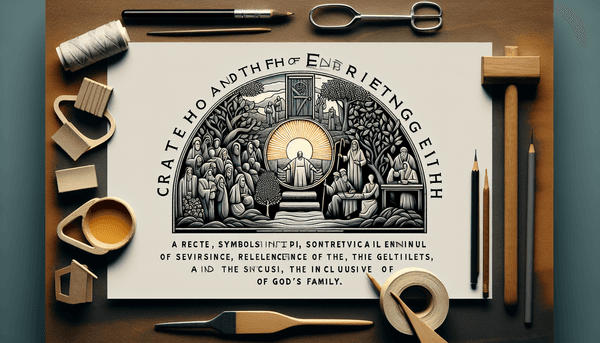Insights from Luke 7
Luke 7 offers a rich narrative of Jesus' miracles and interactions, revealing His compassion, power, and wisdom. Jesus heals a Roman centurion's servant, a display of miraculous power and affirmation of faith from an unexpected source, as noted in Luke 7:9. He raises a widow's son from the dead, showcasing His compassion and authority over life and death, as seen in Luke 7:13-15. The chapter also recounts the poignant moment when a sinful woman anoints Jesus' feet, symbolizing her deep repentance and gratitude. Jesus responds with forgiveness, emphasizing that her sins, which are many, are forgiven—for she loved much. This interaction is a powerful testament to the transformative power of Jesus' love and the importance of a repentant heart, paralleling the parable of the two debtors in Luke 7:41-43. Through these narratives, believers are called to reflect on humility, forgiveness, and the depth of God's grace.
Understanding Sabbath Laws in Context
When Jesus healed on the Sabbath, as recorded in John 5:8-10, He brought into sharp focus the tension between the letter of the law and its spirit. The Jewish leaders' objection to the healed man carrying his bed was based on their strict interpretation of the Sabbath law, which prohibited work. However, Jesus' miracles on the Sabbath highlight His authority to interpret and fulfill the law, as He Himself stated, 'The Sabbath was made for man, not man for the Sabbath' (Mark 2:27). This understanding of law and grace is further explored in an article on how biblical teachings can guide us in forming harmonious relationships, emphasizing the love and respect that should also characterize our Sabbath observance. In the New Testament, the principle of the Sabbath extends beyond a rigid set of rules to encompass mercy, rest, and worship, reflecting the new covenant established through Christ (Hebrews 8:6). For modern Christians, Sabbath observance is often understood as a time for spiritual reflection and rest, aligning with the principle of rest in Christ (Hebrews 4:9-10).
The Trinity in Christianity
The concept of the Trinity is a central doctrine of the Christian faith, encompassing the belief in one God who exists in three Persons: the Father, the Son (Jesus Christ), and the Holy Spirit. While the term 'Trinity' does not appear in the Bible, the foundation for this belief is found in passages such as Matthew 28:19, where Jesus commands His disciples to baptize in the name of the Father, the Son, and the Holy Spirit. This triune nature of God is further reflected in the divine relationship, where the Father sends the Son, and the Son sends the Spirit, as noted in John 15:26. Through the Trinity, Christians encounter the distinct yet united nature of God, a profound mystery that speaks to the infinite and relational nature of the divine, as seen in 1 John 5:7. The Trinity remains a foundational truth that shapes Christian worship, doctrine, and everyday living.
Addressing God as the Holy Father
In the Christian tradition, addressing God as the 'Holy Father' reflects an intimate and reverent relationship with the divine. This term emphasizes both the closeness and the holiness of God, as believers approach Him in prayer. Jesus taught His disciples to pray to 'Our Father in heaven' (Matthew 6:9), highlighting the personal relationship that believers can have with God. At the same time, God's holiness is central to His nature, as seen in Isaiah 6:3, where the seraphim declare, 'Holy, holy, holy is the LORD Almighty.' The New Testament continues this theme, with Jesus referring to God as 'Holy Father' in His prayer for His disciples (John 17:11). Through various titles and names, Scripture reveals the multifaceted relationship between God and humanity, inviting believers to reflect His nature in their lives.






